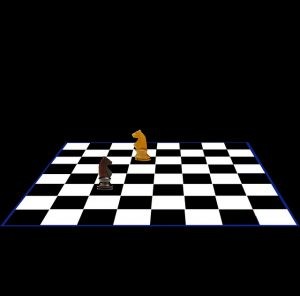Quantum News Briefs August 29: Chessboard-like method enables the operation of largest gate-defined quantum dot system; Quantized Technologies encrypts data using quantum photons; Five common misconceptions about quantum computing + MORE

Quantum News Briefs August 29:
Chessboard-like method enables the operation of largest gate-defined quantum dot system
 Researchers from Delft established a way to address many quantum dots with only a few control lines using a chessboard-like method. This enabled the operation of the largest gate-defined quantum dot system ever. Their result is an important step in the development of scalable quantum systems for practical quantum technology. Quantum News Briefs summarizes August 28 article in Phys.org by Qutech.
Researchers from Delft established a way to address many quantum dots with only a few control lines using a chessboard-like method. This enabled the operation of the largest gate-defined quantum dot system ever. Their result is an important step in the development of scalable quantum systems for practical quantum technology. Quantum News Briefs summarizes August 28 article in Phys.org by Qutech.
Quantum dots can be used to hold qubits, the building blocks of a quantum computer. Currently, each qubit requires its own addressing line and dedicated control electronics. This is highly unpractical and in stark contrast with today’s computer technology, where billions of transistors are operated with a couple of thousand lines.
Researchers at QuTech—a collaboration between the TU Delft and TNO—have developed a similar method for addressing quantum dots. Just like the locations of chess pieces are addressed using a combination of letters (A to H) and numbers (1 to 8), their quantum dots can be addressed using a combination of horizontal and vertical lines. Any point on a chessboard can be defined and addressed by using a specific combination of a letter and a number. Their approach takes the state-of-the-art to the next level and enables the operation of a 16 quantum dot system in a 4×4 array.
Principal investigator Menno Veldhorst saysVeldhorst said, “In another recent publication, we show that an array of germanium quantum dots can be used for quantum simulation.” This work is the first coherent quantum simulation that uses standard semiconductor manufacturing materials. ” Click here to read article in-entirety.
Quantized Technologies encrypts data using quantum photons

UCalgary alum Jordan Smith, BComm’12, BSc’20, MSc’23, and his team in the Faculty of Science are developing an AI-resistant and quantum-secure cybersecurity solution to keep customer data safe from being decrypted with their company, Quantized Technologies Inc. (QTI). Quantum News Briefs summarizes August 25 article in PhotonicsOnline.
QTI’s technology encrypts data using quantum photons (particles of light) that rely on physics rather than math to mitigate data threats. This hardware/software combination distributes encryption keys to legitimate users so that even other parts of the system itself cannot read the key (zeros and ones), making it impossible for intruders that attempt to hack the central system to access the key and decrypt data.
Furthermore, QTI’s hardware is more cost effective than existing quantum key distribution approaches to encryption because several users can be connected to a single photon detection device, rather than each user needing their own. Currently, cost has inhibited the widespread use of quantum key distribution, but needing fewer photon detection devices will make it more accessible to the wider public and keep our data safe.
Smith and QTI are one of four UCalgary startups to receive the Innovation Catalyst Grant (ICG), funded by the Government of Alberta and managed through Innovate Calgary. ICG is an entrepreneurial fellowship that supports recent master’s and PhD graduates in science, technology, engineering and mathematics (STEM) disciplines.
QTI is expected to continue growing in the next few months. They are currently preparing to open a seed round of investment, and they are looking for non-dilutive funding opportunities, strategic funding and technology partners, early adaptors of their technology, and also employees to join their team. Click here to read the PhotonicsOnline article in-entirety.
Five common misconceptions about quantum computing
 Bernard Marr wrote in Forbes recently about five common misconceptions concerning what quantum computing will do and how it will impact society. Quantum News Briefs summarizes the five misunderstanding Marr discussed in his August 23 Forbes article.
Bernard Marr wrote in Forbes recently about five common misconceptions concerning what quantum computing will do and how it will impact society. Quantum News Briefs summarizes the five misunderstanding Marr discussed in his August 23 Forbes article.
Classical Computers Will Be Replaced By Quantum Computers
Quantum computers are not likely to ever replace classical computers (those that translate information into binary bits – ones and zeroes – in order to digitally process it). There are lots of tasks that will simply never require the immense power of quantum computing, which has the potential to perform calculations that would take classical computers billions or even trillions of years in hours.
Quantum Computers Are Faster At Every Kind Of Job
Quantum computers excel at a subset of mathematical problems that are only required for complex tasks. Lots of these involve scientific research. hey are also great for modeling non-quantum, but still highly complex, systems such as financial markets, meteorological patterns and biological ecosystems.
However, when it comes to most day-to-day tasks, we use computers for – from word processing to watching videos and playing games – they’re unlikely to offer any significant speed increase just yet.
Quantum Computing Means The End Of Encryption
Quantum computing has important implications for encryption – the technology that underpins basically all privacy and data security on the internet. It won’t render it all useless, but encryption protocols – including those widely used to secure data on the internet, such as RSA and ECC – are far more vulnerable to quantum-powered hacking attacks than they are to classical hacking attacks. This problem has been on the radar for some time, and cryptologists have been busy working on “quantum-safe” encryption protocols. In the US, the National Institute of Standards and Technology is currently undergoing an evaluation of the threat and potential remedies of post-quantum encryption.
There’s No Practical Use For Quantum Computers Yet
It’s still very early days in the evolution of the quantum revolution, but it’s certainly a mistake to think that it hasn’t started. Delivery giant DHL uses quantum computers to optimize delivery routes. Goldman Sachs has developed quantum algorithms that are used to complete financial calculations, pharmaceutical conglomerate Merk uses quantum chemistry to help develop new antibiotics.
Quantum Computing Is Only Viable For Governments And Big Business
While the cost of quantum computers themselves is certainly high, and they need to be kept and operated in highly secure and controlled environments, access to the technology is coming down in price. Many of the problems that can be solved with quantum computers are relevant to smaller businesses and organizations, such as optimizing supply chains or creating new products more efficiently. This means that quantum computing providers are already developing and offering services designed to make the technology accessible to these businesses. Click here to read Marr’s Forbes article in-entirety.
How to protect critical infrastructure in the quantum-computing era
 Unique issues are involved in cybersecurity for critical infrastructure (CI) such as petroleum pipelines, power stations, electric utilities, water treatment plants, dams, ports, and mass transport systems. Quantum News Briefs summarizes and August 21 article in Federal times by
Unique issues are involved in cybersecurity for critical infrastructure (CI) such as petroleum pipelines, power stations, electric utilities, water treatment plants, dams, ports, and mass transport systems. Quantum News Briefs summarizes and August 21 article in Federal times by
Sandra K. Helsel, Ph.D. has been researching and reporting on frontier technologies since 1990. She has her Ph.D. from the University of Arizona.
…



















